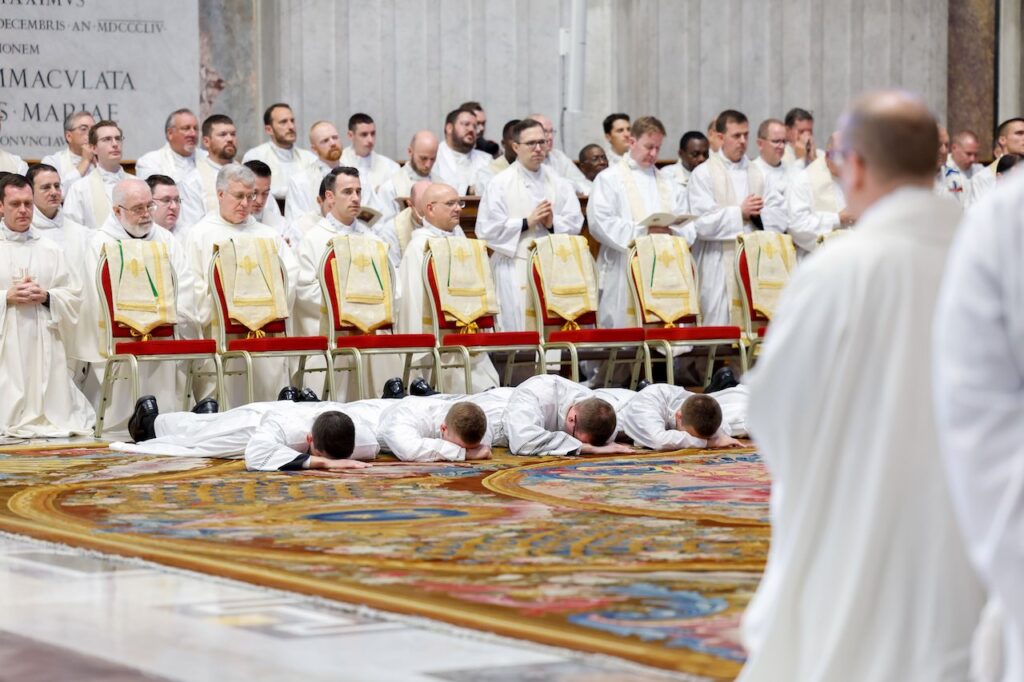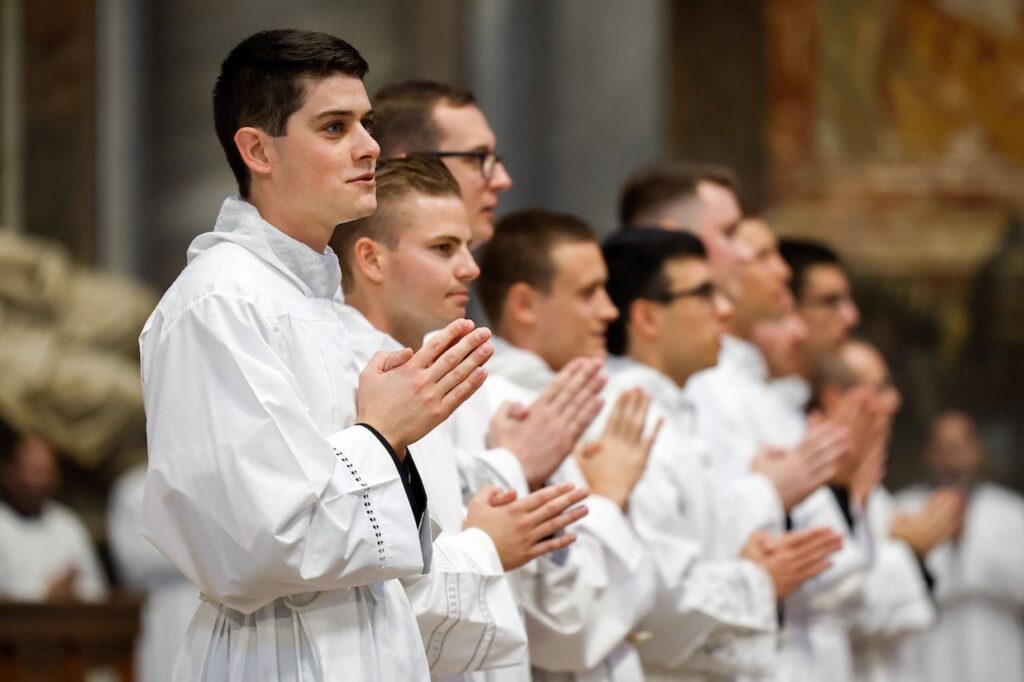VATICAN CITY (CNS) – Near the tomb of St. Peter, 18 seminarians from across the United States promised to dedicate their lives to Christ and were ordained to the diaconate.
Yet for the Church’s next generation of ordained ministers, “it is not enough to be good churchmen, you must be disciples,” Archbishop Paul S. Coakley of Oklahoma City told the new deacons in his homily during the ordination Mass at the Altar of the Chair in St. Peter’s Basilica.
“If any of you seminarians were so naive to believe that priesthood would bring you a privileged existence, we’re about 60 years too late,” he said in his homily during the Mass Sept. 28. “That age of Christendom, that age where Christianity and society were so closely aligned as to sometimes be indistinguishable has passed.”
Archbishop Coakley, who was the main celebrant at the ordination Mass, told the new deacons that in a divided church and in a society “hostile” to Christianity, Christians and their leaders must “prepare themselves not for privilege but for marginalization, for persecution and even martyrdom.”
The archbishop of Oklahoma City urged the seminarians from 16 different dioceses, and one from the Personal Ordinate of the Chair of St. Peter, to look to the saints as examples who “offer a whole alternative to the conventional and planned aspirations of a faithless secular world.”
Three U.S. cardinals – Cardinals Raymond L. Burke, retired patron of the Order of Malta; James Harvey, archpriest of the Basilica of St. Paul Outside the Walls; and Edwin F. O’Brien, retired grand master of the Equestrian Order of the Holy Sepulchre of Jerusalem and a former rector of the U.S. seminary in Rome – concelebrated the Mass with four other bishops and several other priests.
After the Gospel reading from St. John, in which Jesus tells the apostle, “It was not you who chose me, but I who chose you,” each candidate for the diaconate presented himself to Archbishop Coakley, who confirmed the worthiness of the candidates to applause from their many family members, friends and seminary students gathered in the assembly.
Each seminarian promised “to discharge with humble charity the office of the diaconate,” hold fast to the mystery of faith, embrace celibacy, be obedient to his bishop and conform his life to Christ.
In the most ancient part of the sacrament of holy orders, one by one each candidate knelt before Archbishop Coakley who laid his hands atop his head and called the Holy Spirit upon him.
The 18 seminarians then prostrated themselves below the more than 20-foot-tall sculpture of the chair of St. Peter, sculpted by the Baroque Italian master Gian Lorenzo Bernini, to receive the ordination prayer. “May every evangelical virtue abound in them: unfeigned love, concern for the sick and poor, unassuming authority, the purity of innocence and the observance of spiritual discipline,” Archbishop Coakley prayed.

Deacon Joe Wappes of the Archdiocese of St. Paul and Minneapolis told Catholic News Service he had prayed during a spiritual retreat before his ordination in preparation for the “moving” moment of prostration, which he called a “concrete sign of giving back to the Lord everything he’s given to me.”
Exchanging smiles and embraces with their brother deacons, they were vested in stoles and dalmatics, the vestments of deacons, before processing to the altar for the presentation of gifts.
“It’s beautiful to be ordained at the Altar of the Chair here, because it’s a beautiful symbol of unity that we’re all meant to be united in the one spirit, the one authority of the Church, her one teaching,” newly ordained Deacon Joe Brodeur of the Diocese of Providence, Rhode Island, told CNS after the liturgy.
As a minister of the church, Deacon David Lee of the Diocese of Nashville, Tennessee, said, “it’s important to bring both sides together, to be a person who leads people to Christ more than any particular faction.”
Archbishop Coakley told CNS that although “the Church is fractured in many ways,” the new deacons and others following in their footsteps “will have the opportunity to help bridge those divides and bring people together with deeper faith, deeper hope and deeper charity.”
Particularly at a time “more akin to the time after Pentecost, when the apostles were sent out into a world that was very hostile,” the archbishop said that the Church has “an opportunity to stand up in witness to Jesus Christ in faith and charity.”
“This is a sign of hope for the Church that the Lord continues to raise up generous-hearted young men who are willing to give their lives in service of the Church,” he said.

